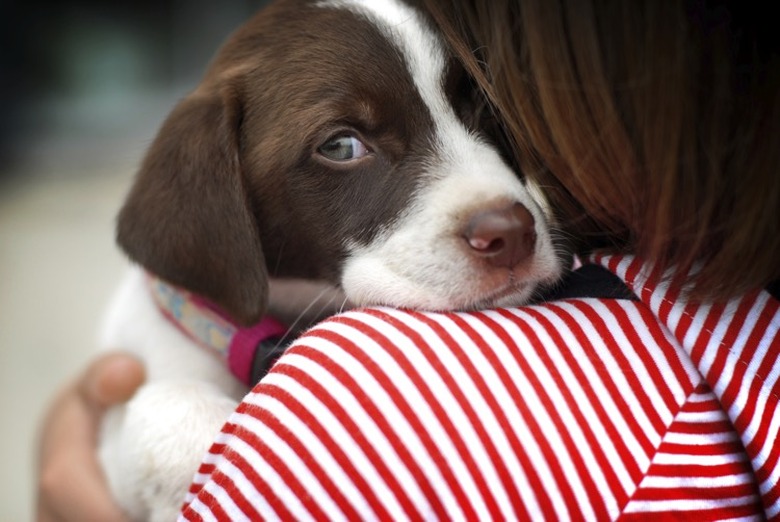Will My Puppy Outgrow His Fear?
According to experts, puppies go through two fear stages on the road to adulthood. This means a puppy who is suddenly fearful and growling may be just "going through a phase." However, it's important that you respond to his behavior correctly to help him grow up to become a friendly, happy dog.
Baby Fear Stage
A few days ago your puppy approached new experiences with curiosity and a wagging tail, but now he is hiding behind your legs and whimpering. Your puppy has likely entered the first fear stage, which usually occurs when he is 8 to 11 weeks old. During this time it's important for you to try to make anything new as pleasant as possible. If he seems overwhelmed by a situation, remove him. Fearfulness and growling during this stage are likely things he will outgrow.
Adolescent Fear Stage
At some point when your puppy is a "teenager," he will likely go through a second fear stage. This stage usually lasts about three weeks and most often occurs when a puppy is about 5 months old. Your dog may suddenly not want to approach a person or situation that he was comfortable with just days earlier. During this fear stage, you don't want to coddle your dog too much, but you also don't want to force him to confront a situation that is scaring him. Just like during the first fear stage, he will likely outgrow the fearfulness and growling that occurs at this time.
Aggression
Growling is most often a dog's way of saying "back off." If your older puppy is fearful and growling, even if he is going through the second fear stage, he is warning that you shouldn't push him further or he might bite. If it's a situation where your dog and others are safe, the best response to your older puppy's fear is often to ignore it. To coddle your puppy when he is afraid may reinforce his feeling that he has reason to be afraid. If you leave him to explore the scary situation on his own, he will soon learn that he had no reason to be afraid. If your older puppy is growling or snapping at another animal or person, however, you should correct that behavior by firmly telling him "no" and removing him, if necessary. Praise him and give him a treat as soon as the aggressive behavior has stopped.
Extra Help
Some dogs have true fear aggression and this is not something they will outgrow without help. In situations of true fear aggression, it's best to work with a behaviorist. Your veterinarian can refer you to a reputable professional in your community who can evaluate your puppy, work with you to help change the behavior, and help your puppy feel safe and happy in his environment.
References
The Bark: Ages and Stages
Wonder Puppy: Puppy Development Stages
Dog Training: Training The Shy Or Fearful Puppy Or Dog
PetPlace.com: Why Do Dogs Growl
About the Author
Bethney Foster is social justice coordinator for Mercy Junction ministry, where she edits the monthly publication "Holy Heretic." She is also an adoption coordinator with a pet rescue agency. Foster spent nearly two decades as a newspaper reporter/editor. She graduated from Campbellsville University, receiving a Bachelor of Arts in English, journalism and political science.
